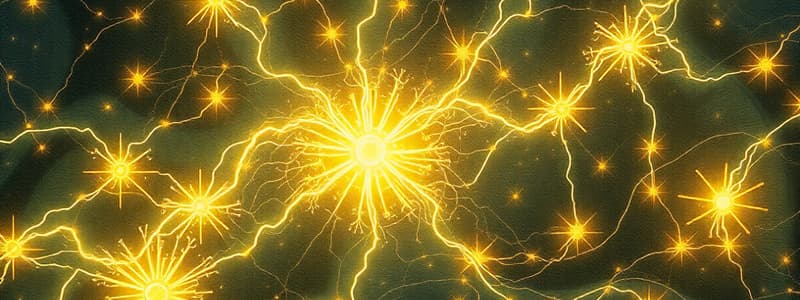Podcast
Questions and Answers
The amount of charge that passes through a wire in a given period of time is termed as electric ______.
The amount of charge that passes through a wire in a given period of time is termed as electric ______.
current
The pathway travelled by electrical energy is called an electric ______.
The pathway travelled by electrical energy is called an electric ______.
circuit
The unit for the current is the ______, named for André Marie Ampère.
The unit for the current is the ______, named for André Marie Ampère.
ampere
An ______ is an instrument which is used to measure electric current.
An ______ is an instrument which is used to measure electric current.
Electricity can make your hair stand up when rubbed by a ______.
Electricity can make your hair stand up when rubbed by a ______.
Electricity is a phenomena based on the presence and flow of electric ______.
Electricity is a phenomena based on the presence and flow of electric ______.
Static electricity does not ______.
Static electricity does not ______.
Dynamic electricity flows through a ______ material.
Dynamic electricity flows through a ______ material.
When you rub materials together, they can become electrically ______.
When you rub materials together, they can become electrically ______.
The electric charge from lightning does not last long enough to power your ______.
The electric charge from lightning does not last long enough to power your ______.
Circuits are often represented using ______.
Circuits are often represented using ______.
The material that gains electrons becomes ______ charged.
The material that gains electrons becomes ______ charged.
Electricity can travel along wires to light or heat your ______.
Electricity can travel along wires to light or heat your ______.
Flashcards are hidden until you start studying
Study Notes
Importance of Electricity
- Essential for modern living; powers homes, schools, and devices like music systems and laptops.
- Enables entertainment and connectivity, highlighting reliance on electrical energy.
Definition of Electricity
- Phenomenon based on the presence and flow of electric charges, primarily electrons.
- Electrons carry a negative charge and repel one another when close together, leading to their movement in conducting materials.
Types of Electricity
Static Electricity
- Doesn't move; arises from friction between materials, causing a transfer of electrons.
- The material gaining electrons becomes negatively charged, while the other becomes positively charged.
- Example: Rubbing a plastic comb on hair and attracting small paper pieces because of induced charges.
Dynamic Electricity
- Involves the continuous flow of electricity through conductors, like copper wires.
- Lightning represents a sudden release of electrical energy but does not provide continuous power.
- Essential for powering electronic devices through consistent electric current.
Electric Current
- Defined as the amount of electric charge passing through a wire over time, measured in amperes (A).
- Electric circuits provide pathways for electric current to travel from the energy source to devices.
- A chemical reaction in batteries causes movement of electrons from the negative to the positive terminal.
Electric Circuits
- Represented using circuit diagrams, incorporating symbols for each component.
- Includes components like batteries (positive and negative terminals), wires, switches, and resistors.
- Switches control the flow of electricity within a circuit.
Measurement of Electric Current
- The instrument used to measure electric current is an ammeter.
- Larger currents indicate a greater flow of electrons and higher amperage.
- André Marie Ampère, an early investigator of electricity, has the unit of current named after him.
Circuit Diagrams
- Components of circuits are simplified using standardized symbols for clarity.
- Conductors are illustrated as straight lines; junctions may form right angles.
- Batteries are denoted with longer and shorter lines for positive and negative terminals, respectively.
Studying That Suits You
Use AI to generate personalized quizzes and flashcards to suit your learning preferences.




